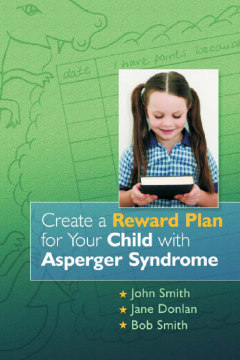
BOOK
Create a Reward Plan for your Child with Asperger Syndrome
John Smith | Jane Donlan | Bob Smith
(2008)
Additional Information
Book Details
Abstract
Reward plans encourage positive behaviour using the incentive of earning rewards. This book provides a thorough nuts-and-bolts guide to creating a reward plan for your child with Asperger Syndrome (AS) to help him or her develop positive behaviours, such as social and communication skills.
John Smith, Jane Donlan and their son Bob, who was diagnosed with AS at age eight, explain the importance of keeping a reward plan positive, specific and challenging enough to be stimulating. Helping your child to learn about positive behaviour while gaining a sense of achievement, a reward plan increases self-esteem, confidence and independence.
Create a Reward Plan for Your Child with Asperger Syndrome is full of advice and practical suggestions for how to tailor a reward plan to meet your child's specific needs.
This excellent book is written by a mother, father and 12-year old son with Asperger syndrome (AS), and is aimed at families that have a child with AS... It is written in an accurate, accessible and positive way and contains a great deal of practical information and suggestion, with clear and concrete instructions and examples... It is full of strategies and tips, well worth investing in.
Communication
John Smith is a mental health social worker and father of Bob. Jane Donlan is Bob's mum and is responsible for Bob's home-education. Bob Smith is twelve years old and was diagnosed with Asperger Syndrome at age eight. He, his parents and his dogs live in the north of England.
John, Jane and their son Bob, aged 12, who has Asperger syndrome, explain the importance of keeping a reward plan that is positive, specific and challenging enough to be stimulating. This book is full of practical suggestions on how to tailor a reward plan to meet your child's specific needs.
Communication
John Smith, Jane Donlan and their son Bob, who was diagnosed with AS at age eight, explain the importance of keeping a reward plan positive, specific and challenging enough to be stimulating. Helping your child to learn about positive behaviour while gaining a sense of achievement, a reward plan increases self-esteem confidence and independence.
Create a Reward Plan for Your Child with Asperger Syndrome is full of advice and practical suggestions on how to tailor a reward plan to meet your child's specific needs.
ASGMA
This book explains how providing children with Asperger syndrome with a customised reward plan can encourage positive behaviour by helping to increase self-esteem, confidence and indepence.
Children and Young People Now
A guide to creating a reward plan to help a child develop positive behaviours such as social and communication.
Current Awareness Service
This excellent book is written by a mother, father and 12-year old son with Asperger Syndrome(AS), and is aimed at families that have a child with AS. The strategies outlined are likely to be helpful for children of all ages, including teenagers. It sees things from both parents; and child's points of veiw and shows how important it is to deal with difficulties as a family, with adjustments taking place on both sides. It is written in an accurate, accessible and positive way and contains a great deal of practical information and suggestions, with clear and concrete instructions and examples. It is full of strategies and tips, well worth investing in.
Communication
Table of Contents
| Section Title | Page | Action | Price |
|---|---|---|---|
| 1. Introduction: working with men for gender equality | |||
| 2. ‘I can do women’s work’: reflections on engaging men as allies in women’s economic empowerment in Rwanda | |||
| 3. Promoting male involvement in family planning in Vietnam and India: HealthBridge experience | |||
| 4. ‘Before the war, I was a man’: men and masculinities in the Eastern Democratic Republic of Congo | |||
| 5. Sympathetic advocates: male parliamentarians sharing responsibility for gender equality | |||
| 6. ‘Because I am a man, I should be gentle to my wife and my children’: positive masculinity to stop gender-based violence in a coastal district in Vietnam | |||
| 7. Domestic violence prevention through the Constructing Violence-free Masculinities programme: an experience from Peru | |||
| 8. ‘One Man Can’: shifts in fatherhood beliefs and parenting practices following a gender-transformative programme in Eastern Cape, South Africa | |||
| 9. Whose turn to do the dishes? Transforming gender attitudes and behaviours among very young adolescents in Nepal | |||
| 10. Where the boys are: engaging young adolescent boys in support of girls’ education and leadership | |||
| 11. Men’s involvement in gender equality – European perspectives | |||
| 12. Resources |
